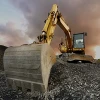40 careers found.
Civil engineering technicians conduct tests of construction materials and prepare sketches and tables for civil engineers and civil engineering technologists. They assist with the research, design, construction, operation and maintenance of projects such as roads, airports, railways, buildings, bridges, dams and drainage systems.
Civil engineering technologists assist civil engineers in the research, design, construction and maintenance of civil engineering projects. Typical projects include dwellings, large buildings, railways, roads, bridges, airports, ports and docks, dams and water supply systems.
Cleaners clean schools, construction sites, commercial, industrial and domestic premises, industrial machinery and vehicles using portable cleaning equipment.
Crane operators control mobile or stationary cranes to lift, move and place objects at locations such as building and construction sites, wharves and shipyards.
Divers carry out a range of duties underwater using self-contained underwater breathing apparatus (SCUBA), surface breathing apparatus or underwater work chambers. With experience, and sometimes further training, divers may become a ship's diver or dive supervisor.
Doggers attach slings to cranes and direct the movement of loads handled by cranes in locations such as manufacturing plants, construction and mining sites, and the maritime industry.
Geographic information systems officers design, develop and customise geographic information systems and provide technical and analytical support to address issues such as environmental management, exploration and mining, land ownership and titles, urban and regional planning, utilities and asset management, and demographic marketing.
Interior designers design and supervise the construction or redevelopment of building interiors.
Landscape architects plan and design land areas for projects such as parks, schools, roads, sports complexes, holiday resorts, shopping centres, national parks and playgrounds. Landscape architects may specialise in projects such as parks, playgrounds, roads or public housing. They may also specialise in types of services, such as regional planning and resource management, site selection, cost studies or site construction.
Mechanical engineering associates assist mechanical engineers and engineering technologists with the design, manufacture, construction, operation and maintenance of machines, manufacturing equipment, mechanical installations and mechanical facilities. They usually have a range of duties carried out under the direction of mechanical engineers and engineering technologists.
Mobile plant operators drive backhoes, bulldozers, excavators, front-end loaders, graders, scrapers, skid-steer loaders, rollers and forklift trucks to level, excavate, move and load earth, rock and other material.
Model makers construct full-size and scale models of landscape, engineering, architectural, automotive and other industrial designs. They work from scale drawings, plans, photographs and lists of figures or specifications requiring conversion to three-dimensional form. These models help designers to see how a project, such as a building or a car, will look or work before it is completed. Some model makers, such as automotive clay modellers, may specialise in high-quality artistic work, while others may concentrate on technically accurate models.
Naval architects design and oversee the construction, survey and repair of marine craft and floating structures, including naval craft, passenger and cargo ships, submarines, high-speed ferries and catamarans, tugs, boats, yachts and oil rigs.
Production or plant engineers plan, direct and coordinate manufacturing activities in industrial plants, including the design, construction, modification, performance and maintenance of equipment and machinery.
Project and program administrators plan and administer programs, special projects and support services, including management or staff. Project and program administrators can work for either public or private sector organisations. They are responsible for ensuring that projects such as major building and construction or information technology infrastructure, or programs such as new government policies, are designed and completed on time and within budget.








